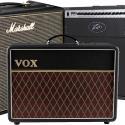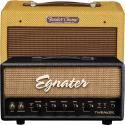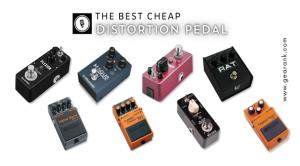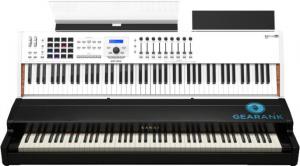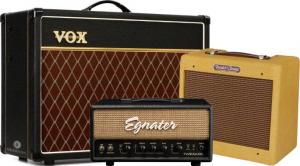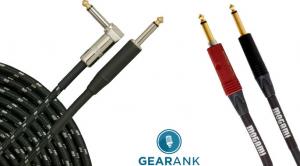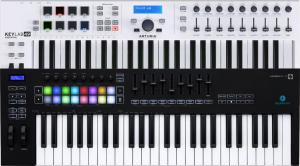Tube Amp vs Solid State: Everything You Need to Know
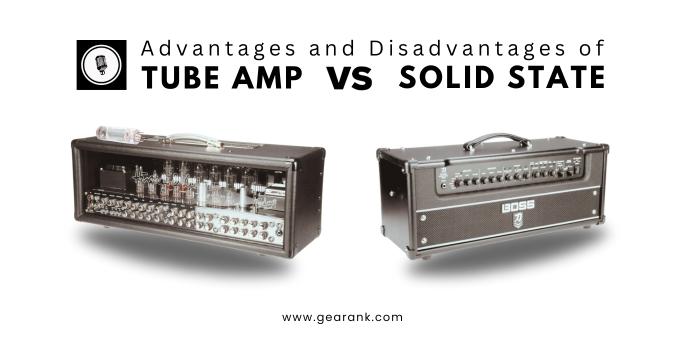
When choosing between a tube amp vs solid state amp, certain factors must be considered.
Both types of guitar amplifiers serve the same purpose of amplifying sound, but their unique methods of operation yield different tone characteristics.
This difference in the final sound is what makes musicians feel strongly about their preferred amp type. In this article, I will highlight the distinguishable qualities of both tube and solid-state amps. Both their positives and the cons.
-
What Is A Tube Amp?
-
What Is A Solid State Amp?
-
Benefits of a Tube Amp vs Solid State Amp
-
Disadvantages of a Tube Amp vs Solid State Amp
-
Which Is Actually Better: Tube or Solid State Amps?
By the end of this article, you will have a clear understanding of the pros and cons of each type and how these two types of amps can address your unique needs as a musician. This will enable you to create a signature sound that is both unique and possibly even iconic. So, let's dive in.
What Is A Tube Amp?
Tube amps, aka valve amps, are the preferred choice of guitarists. It's due mainly to their rich and harmonically complex sound and their sensitive response. This feature becomes more evident as the guitar amp tubes' volume increases.
Tube amplification is a pretty old audio technology, it was used on radios and televisions. These days, tubes are rarely used in day to day devices, but you can still find them in vintage and modern tube amps.
Tube amps are named after the glass vacuum tubes inside each amp. These tubes are paired with high voltage circuitry that help them produce their iconic sound,. Both the preamp stage and power amp sections consist of these tubes.
The preamp receives the instrument or mic-level signal, then it converts it into a usable line-level electrical signal while adding the tonal characteristics expected of tube preamps. The signal is then further boosted in the power amp stage by the power tubes before being fed to the speakers.
As you push the preamp signal further, the tube sound will naturally begin to distort. However, the distortion from tube amps is generally pleasing to the ears because of how the tube saturates when overloaded, resulting in soft clipping with more natural-sounding rounded waveforms.
This is the main reason why tube amps are the preferred choice for great overdriven tones. If you're a rock guitar player with always-on distortion, a good tube amp is perfect for your needs. You can achieve distorted tones without the piercing highs and harshness.
One of the best tube amps out there is the Vox AC15C1. It has a tighter response, which is great for modern indie and alternative music.
What Is A Solid State Amp?
Solid-state amplifiers, aka transistor amps, were developed after tube amps. Solid state amplification utilizes transistors instead of glass vacuum tubes, which are more resilient, affordable, energy efficient, and lightweight. But the downside is that these solid state devices produce a different sound.
When a solid-state transistor reaches its limit, the signal is abruptly clipped, resulting in a more abrupt and harsh distortion called hard clipping.
Nonetheless, this won't be a problem if you're using solid-state amps for clean music. For example, if you're playing bass or keyboards, Solid-state amps can provide a clear and clean sound for these applications. This clear sound is also favored by jazz guitarists.
Solid-state amps are popular among different types of musicians. Radiohead and The Police are two examples of artists who appreciate using solid-state amps.
Benefits of a Tube Amp vs Solid State Amp
Tube Amps' Benefits
-
Harmonic Distortion: This is the main reason why tube amps produce a full and harmonically comples sound that is pleasing to the human ear. Unlike solid-state amps, tube amps sound quality is achieved by saturating the signal.
This causes asymmetrical distortion in the signal. Asymmetrical distortions produce even-order harmonics and overtones.
Even overtones are made up of octaves and fifths; that's why they sound more musical and pleasing to the ear.
-
Great Dynamic Response: Tube amps are also known for their sensitive response. They accurately represent the intricacies of your music as you play it.
-
Loud Volume: Additionally, tube amplifiers are generally speaking, louder than solid-state amps. And since they don't hard clip, they sound good even with the volume maxed out.
-
Customizable: Swapping valves or tubes can further enhance your sound (as long as they are compatible). This process of changing tubes (also called tube rolling) allows you to tweak the amp's tone.
-
Note: When done incorrectly, swapping tubes can potentially cause damage to your equipment. If you're unsure how to do it, it's best to seek assistance from a professional.
Solid State Amps' Benefits
-
Reliability: They are highly reliable and can withstand the rigors of life on the road. This is great, especially if you're a touring musician.
-
Lightweight: Solid states are also significantly lighter than tube amps, especially class D amplifiers. This makes them more convenient to carry around, unlike their tube counterparts.
-
Price: Additionally, they are cheaper than tube amps. A smart choice for beginners or those on a tight budget.
-
Cost-effective: Solid-state amps are also cost-effective, requiring minimal maintenance, and there's no need for regular replacement of tubes or valves.
-
Clean Sound: Musicians appreciate the clear sound produced by solid-state amps. They are preferred by acoustic guitarists, jazz musicians, bassists, keyboard players, and more.
-
Interestingly, some rock and metal artists like the scuzz or harsh distorted tone of a solid-state amplifier. Generally, this tone is considered unpleasant. But, in certain applications, it can add a distinct vibe to the music.
Disadvantages of a Tube Amp vs Solid State Amp
Tube Amps' Disadvantages
-
Replacing Tubes: Tube amps require a significant amount of maintenance. The tubes or valves need to be replaced every few years (more frequently if you're always pushing them).
-
Weight: Tubes are heavier compared to solid-state components. This can be tough if you're a touring musician who needs to move most of the time.
-
Expensive: Because tubes are not as widely produced, tube amps are generally more expensive than solid-state amps. Maintenance cost for replacement tubes could also accumulate and become more expensive as the years go by. Some tube amps also feature hand-wired circuitry, which can drive the price up further. For many beginner guitar players, tube amps won't be worth the expense.
-
Delicate: Tube amps require serious maintenance. The valves are delicate and require handling care. Each vacuum tube inside these amps can easily get damaged if handled carelessly or if you drop them. and it's not just the vacuum tubes, some of its other components are also delicate.
-
Sound in Low Volume: While tube amps are great loud, as a general rule, they aren't brilliant at lower volumes.
Solid State Amps' Disadvantages
-
Symmetrical Distortion: The biggest disadvantage of solid-state amps is the lack of natural distortion. When pushed to their limit, solid-state amps hard clip the signal instead of saturating it.
This results in the signal having uneven or odd harmonics or overtones. In theory, these overtones are made up of thirds, forming a dominant seventh chord.
To put it simply, it doesn't sound good when driven hard, as it has a harsh distortion sound. Solid-state amps also tend to sound thin and lack the coloration that tube amps provide.
-
Less Detail in Sound: When you turn solid-state amplifiers up, you start to hear problems. The transistor interior clips the sound in a harsh way, creating a lot of unwanted noise and buzz. If you like to play it loud, the intricacies of your playing can be lost.
-
Less Response: On a similar note, solid-state amps are not as responsive or expressive when driven hare. This ties back into tone and distortion. But for clean-tone use, solid-state amps have enough sensitivity.
Which Is Actually Better: Tube or Solid State Amps?
When it comes to tone, tube amps have the advantage. Hence the reason why tube amps are preferred by electric guitar players. Tube tone is also the choice for improving sound via a reamp box.
But good tone is just one aspect of an amp. When you factor in reliability, value, and portability, solid state amps become the better choice.
Note that bass and keyboard players also tend to choose solid-state amps for their cleaner tone. Even jazz payers are noted to like the sound of solid-state amps.
At the end of the day, choose tube amps if you have the money to invest and you have the strength to carry it around for gigs. Go for solid-state amps if reliability is more important to you and you get your tones from guitar processors.
Conclusion
There are a lot of key differences between a tube amp vs solid-state amp. Each one has its own way of addressing your needs as a musician.
If you're a rock guitarist, nothing quite matches a tube amp's smooth, rich overdrive. Tube amps are also the perfect amp for blues musicians who require a combination of grit, clarity, and sensitivity to nuances.
On the other hand, if you're an acoustic guitar, bass, or keyboard player, you probably won't need as much distortion. This makes a solid-state amp a great fit for your playing style.
You also have to factor in portability and reliability, which solid-state amps are better known for.
As you select between these two amps, remember that the ultimate goal is to fully express your music - and do so consistently. Find a good balance between your practical and musical needs.
Frequently Asked Questions
What Are Digital and Hybrid Amps?
Digital amps (also called modeling amps) convert analog signals to digital, allowing for DSP (digital signal processing) amp models and effects. These getting better at replicating the sound of genuine tube amps.
Hybrid amps, on the other hand, combine both tube and solid-state technology. A hybrid amp typically has a tube preamp and a solid-state power amp section.
Can You Actually Hear the Difference Between Tube and Solid State Amps?
Most of the time, the difference between the two is easily noticeable, especially when driven hard.
Interestingly, some newer solid-state amps can sound just like tube amps. Amps such as the Solid State Fender Tone Master Amp can even be mistaken for a tube amp.
Why Are Tube Amps So Expensive?
Tube guitar amps use multiple glass tubes, which are considered specialized components. Tube amps also require more intricate craftsmanship which ups the price further, compared to their solid state counterparts.
In comparison, the transistors of a solid-state amp are cheaper to produce. They're also easier to maintain and can go for years without getting changed.
Do All Professionals Always Use Tube Amps?
No. Solid-state amps work well with certain instruments and genres. Personal preference also plays a big role in the choice. Some musicians choose solid-state amps deliberately to shape their sound.
Who Are the Professionals Using Solid State Amps?
While pro musicians have their favorite tube amps, they do use different amps to achieve different tones. This includes using solid-state amps. Guitarists who have used solid-state amps incllude big names like Carlos Santana, Eric Clapton, Mark Knopfler, and more.
Some professional musicians use solid-state amps for their signature sound, like John Fogerty with his Kustom solid-state amp. Andy Summers is also another example, with his Roland JC-120 Jazz Chorus Amp.
Contributors:
- Jerome Arcon - Co-writer
- Jerry Borillo - Illustrator




